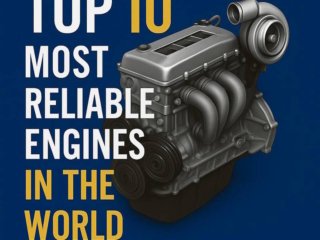The BMW N20 engine, introduced in 2011, is a 2.0-liter inline-four, turbocharged petrol engine designed to replace the naturally aspirated six-cylinder N52 and N53 engines. While the N20 is praised for its power, efficiency, and versatility, it is also known for several reliability concerns. Used in models like the BMW 3 Series (F30), 5 Series (F10), X1 (E84), and others, the N20 has experienced a range of common issues, especially in earlier production years.
Most Common BMW N20 Engine Problems
1. Timing Chain and Guide Failure
Symptoms: Rattling or ticking noise from the engine, especially during startup.
Engine misfires, loss of power, or rough idling.
Check engine light (CEL) or complete engine failure in severe cases.
Cause: Early production N20 engines (2011–2015) have weak timing chain guides made of brittle plastic. Over time, these guides degrade, causing timing chain slack and eventual failure. A snapped timing chain can result in catastrophic engine damage.
Fix: BMW issued a technical service bulletin (TSB) for this issue and extended the warranty for affected engines in certain regions. Replacing the timing chain, guides, and tensioner (known as the timing chain service) is necessary, typically between 60,000-100,000 miles.
2. Valve Cover and Valve Cover Gasket Oil Leaks
Symptoms: Oil smell from the engine bay.
Oil leaks visible around the valve cover area.
Rough idling or misfires if oil leaks onto ignition components.
Cause: The valve cover gasket becomes brittle over time due to heat cycles, leading to leaks. Occasionally, the valve cover itself can crack.
Fix: Replace the valve cover gasket, or the entire valve cover if cracked.
3. Oil Filter Housing Gasket Leaks
Symptoms: Visible oil leak around the oil filter housing.
Low oil levels or engine warning lights.
Potential mixing of oil and coolant, leading to overheating or engine damage.
Cause: The gasket between the oil filter housing and the engine block degrades over time due to heat, causing oil to seep out or mix with coolant.
Fix: Replace the oil filter housing gasket promptly to prevent further damage.
4. High-Pressure Fuel Pump (HPFP) Issues
Symptoms: Difficulty starting the engine.
Rough idling, engine misfires, or stalling.
Check engine light and reduced performance.
Cause: The high-pressure fuel pump can fail, a problem not uncommon in BMW turbocharged engines. The N20’s HPFP, while improved compared to the N54/N55 engines, still faces occasional reliability issues.
Fix: Replace the HPFP. This issue is less frequent but still worth monitoring.
5. Turbocharger Wastegate Rattle
Symptoms: Metallic rattling noise from the engine bay, especially at low RPMs or during deceleration.
Reduced turbo performance or erratic boost levels.
Cause: The wastegate actuator develops slack over time, causing the wastegate flap to rattle. In severe cases, it can affect turbo performance.
Fix: Adjust the wastegate actuator or replace the turbocharger if the issue persists.
6. Coolant System Issues
Symptoms: Overheating or coolant leaks.
Low coolant warnings.
Engine running hotter than normal.
Cause: Weak points in the water pump and thermostat, common failure points in many BMW engines. Additionally, plastic coolant hoses and fittings can degrade over time.
Fix: Replace the water pump, thermostat, and any leaking hoses. BMW’s electric water pumps typically last 60,000-80,000 miles before needing replacement.
7. Carbon Build-Up on Intake Valves
Symptoms: Rough idle, reduced performance, engine misfires, or poor fuel economy.
Cause: The N20 uses direct fuel injection, which can cause carbon deposits to accumulate on the intake valves over time as fuel does not clean them.
Fix: Perform walnut blasting every 50,000-70,000 miles to clean the intake valves. Using premium fuel and fuel system cleaners may help reduce build-up.
8. Excessive Oil Consumption
Symptoms: Frequent low oil warnings or the need to top off oil frequently.
Cause: Worn piston rings or turbocharger seals can lead to oil consumption. This is more common in high-mileage engines or engines that were not maintained with regular oil changes.
Fix: Monitor oil levels and top off as needed. Address worn piston rings or turbo seals if oil consumption becomes excessive.
Key Maintenance Tips for the BMW N20 Engine
Frequent Oil Changes:
Change the oil every 5,000-7,000 miles, using BMW-approved synthetic oil. This prevents premature wear of the turbocharger and timing chain components.
Timing Chain Inspection:
Have the timing chain and guides inspected regularly, especially if the engine produces unusual noises or exceeds 60,000 miles.
Coolant System Maintenance:
Replace the water pump and thermostat every 60,000-80,000 miles to prevent overheating issues.
Flush the coolant system as recommended by BMW.
Carbon Cleaning:
Perform walnut blasting every 50,000-70,000 miles to address carbon build-up.
Monitor for Leaks:
Regularly check for oil or coolant leaks around the valve cover, oil filter housing, and expansion tank.
Use Premium Fuel:
Always use 91+ octane fuel to optimize performance and reduce the risk of carbon build-up.
Conclusion: Is the BMW N20 Engine Reliable?
The BMW N20 engine is generally reliable if properly maintained, but early production models (2011–2015) are more prone to timing chain issues. With a proactive approach to maintenance, especially addressing timing chain, gasket leaks, and carbon build-up, the N20 can deliver many years of service. If you’re buying a used car with this engine, ensure that it has a complete service history and that any timing chain-related issues have been resolved.



